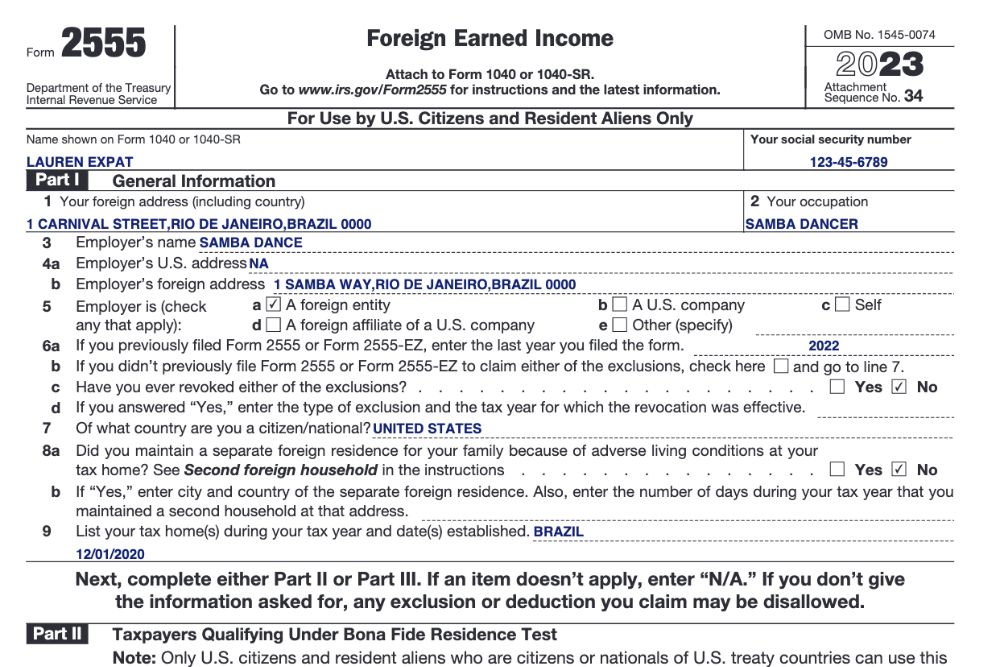What Is the Foreign Housing Exclusion? A Guide for Expats

- What Is the Foreign Housing Exclusion Exactly?
- How Do I Qualify for the Foreign Housing Exclusion?
- How Much Is the Foreign Housing Deduction?
- How to Calculate your Foreign Housing Deduction
- What Are Qualified Housing Expenses?
- How to Claim the Foreign Housing Exclusion
- Greenback Accountants Can Guide You Through Every Applicable Deduction and Exclusion
The Foreign Housing Exclusion, sometimes referred to as the Foreign Housing Allowance or Foreign Housing Deduction, is a lesser-known money saver that can help limit expats’ tax liability. With appropriate preparation and a little foresight, this exclusion can increase the affordability of living overseas.
Better yet, if you’re planning on using the Foreign Earned Income Exclusion (FEIE) as well, this deduction requires no extra paperwork. Learn what expats need to know to save money with the Foreign Housing Exclusion and Foreign Housing deduction with Form 2555.
Key Takeaways
- The Foreign Housing Exclusion lets Americans deduct certain foreign housing expenses from their taxable income.
- Most expats who qualify for the Foreign Earned Income Exclusion are also eligible for the Foreign Housing Exclusion.
- To claim the Foreign Housing Exclusion, you must file IRS Form 2555.
What Is the Foreign Housing Exclusion Exactly?
The Foreign Housing Exclusion decreases an expat’s tax liability by allowing certain housing expenses to be deducted from taxable income. The IRS created it to offset the expenses that go hand-in-hand with living overseas.
Generally, the foreign housing exclusion can be used for many expenses related to housing that is not paid using a US-based employer. This includes rent, utilities, and repairs but does not include cable, phone, or domestic helper/servant costs. It also includes property insurance, small repairs you make that you are not reimbursed for, and parking fees near your home.
Use our simple excel calculator to get an estimate of how the foreign earned income exclusion will save you money. It will make your day!

How Do I Qualify for the Foreign Housing Exclusion?
The first step to qualifying for the Foreign Housing Exclusion is by qualifying for the FEIE. In order to be eligible for the FEIE, you need to pass either the physical presence test or the bona fide resident test.
- The bona fide residence test is passed by being in your country of residence for an uninterrupted calendar year (January 1st to December 31st).
- The physical presence test is passed by being physically present for 330 full days for any 12 consecutive months. The 330 days do not have to be consecutive, meaning those new to the expat lifestyle or those who moved midyear can pass this test more easily. Note that even one minute spent in the US counts as a full day in the US and there are generally no exceptions allowed if you are in the US for 35 days or more.
In addition, your housing costs must have been greater than 16% of the FEIE amount for the given tax year in order to use the Foreign Housing Exclusion.
How Much Is the Foreign Housing Deduction?
When you live abroad, you may qualify for the Foreign Housing deduction and exclusion. The Foreign Housing deduction is based on your actual housing expenses abroad, up to 30% of the Foreign Earned Income Exclusion (FEIE), minus a base housing amount of 16% of the FEIE. For 2023, since the FEIE is $120,000, therefore, the base housing amount is 16% of this figure, which is $19,200.
For the 2023 tax year (reported in 2024), the maximum foreign housing exclusion or deduction is typically set at 30% of the FEIE; 30% of $120,000 would be $36,000. This is the upper limit on the amount you can exclude or deduct from your foreign housing costs.
How to Calculate Your Foreign Housing Deduction
To calculate your Foreign Housing Exclusion (or Deduction), first, tally up your qualifying expenses.
Keep in mind that, in order to use the exclusion, your qualifying housing costs must exceed 16% of the FEIE amount for the specific tax year ($19,200 for the 2023 tax year – 16% of $120,000). This amount is considered the base housing cost for living in the United States.

So long as your qualifying expenses exceed the base housing cost, you can exclude (or deduct) the total of your qualifying expenses up to the maximum amount allowed for the tax year.
If you live in a city that is identified by the IRS as “ultra-high cost,” you may be able to use an additional amount for the foreign housing exclusion. The current list is included in the IRS’ instructions for completing Form 2555
What Are Qualified Housing Expenses?
Rent and utilities are qualified expenses, as are parking, household repairs, real and personal property insurance, and furniture and accessory rentals. Please note that purchases of furniture or other housing expenses will not qualify for the Foreign Housing Deduction, nor will mortgage payments or domestic labor. Qualified housing expenses are reported on Form 2555 along with the foreign earned income exclusion.
| Qualified Housing Expenses | Non-Qualifying Housing Expenses |
|---|---|
| rent | mortgage payments |
| utilities (except for telephone, TV services, and internet) | domestic labor (maids, housekeepers, etc.) |
| personal property insurance (such as homeowner’s or renter’s insurance) | purchased furniture |
| leasing fees | anything deemed “lavish or extravagant” |
| furniture rental | |
| parking rental | |
| repairs |
How to Claim the Foreign Housing Exclusion
Once you’ve determined that you qualify for the FEIE, you need to elect it via Form 2555.
If you are self-employed, you will use the Foreign Housing Deduction. As the name implies, this version of the tax benefit works as a deduction rather than an exclusion. This means that you would not combine your housing expenses with your FEIE. Instead, you would report your housing expenses on your Form 1040 (on line 36, in the adjustments category, to be specific).
Is it Beneficial for a Husband and Wife to Split the Foreign Housing Exclusion?
When it comes to Foreign Housing Exclusion (FHE), married couples often wonder if they can both claim it. Unfortunately, if you and your spouse live in the same household, you won’t be able to do so. Your options are either to file a joint tax return with one FHE claim or to file separate returns with only one of you claiming the FHE.
However, if you and your spouse live in separate households, there is a possibility for both of you to claim the FHE. Each partner can file separate claims for their respective household. But do keep in mind that your households cannot be within commuting distance of one another.
It’s important to note that filing jointly with one FHE claim may offer many benefits, so filing separate returns with individual FHE claims is not always guaranteed to be a better option. It’s crucial to carefully evaluate your specific situation and seek professional tax advice to determine the best approach for you and your spouse in order to optimize your tax situation.
Greenback Accountants Can Guide You Through Every Applicable Deduction and Exclusion
If you want to be sure you don’t miss out on any money-saving exclusions available to you, get started with Greenback today, and find out why expats worldwide consistently choose Greenback for simple, accurate, expat tax prep – including foreign housing exclusions. If you’re ready to be matched with a Greenback accountant, click the get started button below. For general questions on expat taxes or working with Greenback, contact our Customer Champions.



